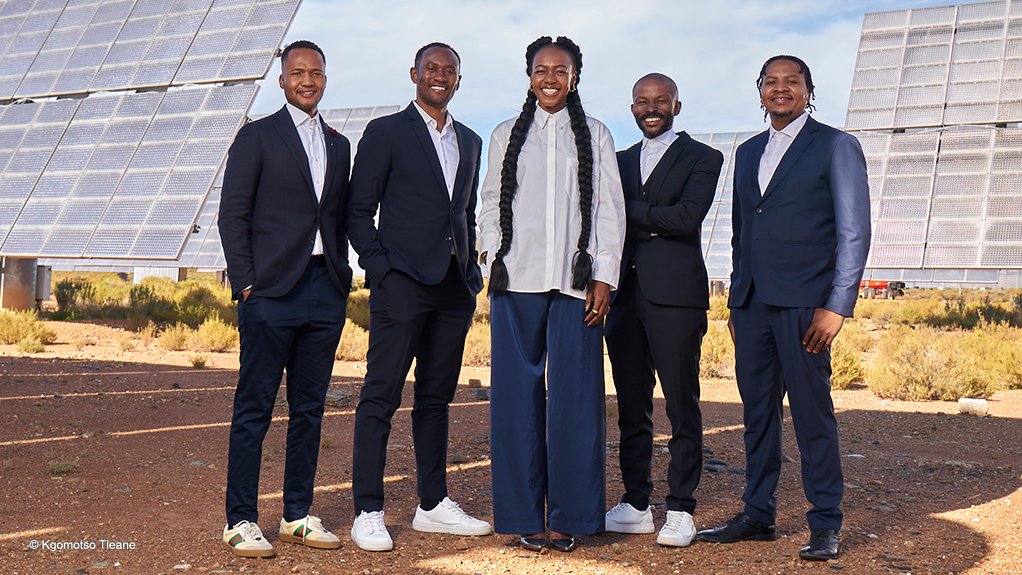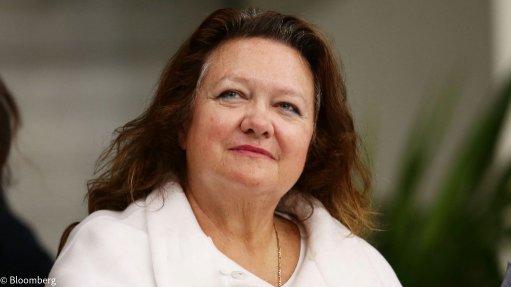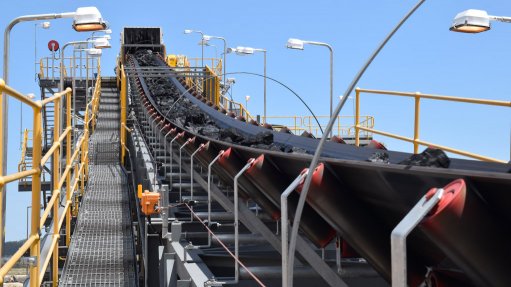Private offtake market adds new impetus to black energy group’s pioneering IPP journey


Pele Energy Group Founders (from left to right): Thapelo Motlogeloa, Gqi Raoleka, Fumani Mthembi, Obakeng Moloabi and Boipelo Moloabi
Photo by Kgomotso Tleane
The journey by South Africa’s Pele Energy Group (PEG) from fledgling energy investor to that of a pioneering black-owned and -managed independent power producer (IPP) is receiving fresh impetus from an unexpected source: the robust private-offtake market that has been stimulated by a recent reform allowing for distributed generation projects of any size to proceed without a licence.
MD Gqi Raoleka reports that the company has steadily expanded its portfolio from 800 MW in 2016 – when Engineering News ran a feature on how the five young black professionals who founded PEG had aspirations to become a fully-fledged IPP – to approximately 2 000 MW currently.
In addition, it has a wind and solar project pipeline that could result in that portfolio more than doubling over the coming three to five years, and has moved not only to take far larger equity stakes in projects led by established IPPs, but also to position PEG as a lead sponsor in certain instances.
It has already started to progressively take far larger equity positions in projects linked to South Africa’s most recent Renewable Energy Independent Power Producer Procurement Programme (REIPPPP) bid windows than was the case in earlier rounds when it took up stakes of between 20% and 31%.
During REIPPPP Bid Window Five (BW5), PEG bid alongside Engie and won three 75 MW solar projects, namely Graspan, in the Northern Cape, as well as Grootspruit and Sannaspos, in the Free State.
“We hold 47.775% across all three projects with Engie holding 49.725% and the local community holding 2.5%,” Raoleka reports, indicating that the company is, thus, maturing into a “pari passu” investment partner.
Similar arrangements were developed for BW6, but as was the case for several other wind bidders during the round, PEG’s projects were unsuccessful, as they were located in areas where Eskom determined that the grid infrastructure had already been fully absorbed.
Raoleka, together with PEG’s other founders – Obakeng Moloabi, Fumani Mthembi, Boipelo Moloabi and Thapelo Motlogeloa – are not satisfied, however, and are currently in the process of pursuing certain projects as the lead sponsor.
It already has something of a template in place at the 36 MW Solar CPV 1, located in the Western Cape, where PEG is the power plant manager, as well as the majority 55% shareholder, with the Public Investment Corporation holding 40% and the local community 5%.
The project remains its flagship and has given the company the crucial hands-on experience it requires as it targets even greater independence and growth, including growth in employment, which has increased from 20 employees seven years ago to 90 today.
Raoleka expects its employee numbers to rise to about 136 by year-end should all its near-term projects materialise, including those where it is the dominant partner.
Interestingly, the company’s inaugural project as lead sponsor is likely to arise from outside of the REIPPPP framework, which offered PEG its initial opportunity to break into the market by stipulating black ownership and management participation as a qualifying criteria.
“We are in the process of closing a portfolio of just under 1 GW of private offtake projects,” Raoleka tells Engineering News, adding that clients in the mining sector have been particularly supportive of ensuring that the company plays a lead role in these projects.
“That's the exciting thing about having a multiple-offtake reality in South Africa, as under REIPPPP we couldn’t focus on developing a long-term relationship with a specific client.
“Now we have mining clients that are keen to build a long-standing relationship with us, not only because they have long-life assets, but they also understand the value of partnering with black companies and existing communities, particularly those located near their mines,” he explains.
Raoleka is unable to name the client ahead of financial close, but says that milestone is expected to be achieved within the coming months.
He also expects additional private-to-private opportunities to emerge as a result of the investment that is arising following the amendment to Schedule 2 of the Electricity Regulation Act, which initially removed the licensing requirement for distributed-generation projects below 100 MW but was later adjusted to remove that threshold altogether.
President Cyril Ramaphosa reported recently that there were more than 100 active projects in this category at various stages of development, representing over 10 000 MW of new generation capacity and over R200-billion of potential private sector investment.
That said, PEG will continue to pursue public procurement opportunities and is also widening its scope beyond renewables to include battery energy storage and possibly gas-to-power.
In these new areas it will initially participate as a minority equity partner, however.
Hitherto, PEG has been able to raise the capital it requires to participate in electricity projects through a preference share funding arrangement with Investec.
The most recent transaction concluded in March 2020 has provided the company with the wherewithal to fund both its growth and working capital requirements.
“We are working with a consortium of leading financial institutions to significantly increase the group’s investment capacity to fund out a 2 GW to 3 GW pipeline of renewable opportunities,” Raoleka says.
However, he does not discount the prospect of taking PEG public at some point given the capital-intensive nature of the electricity projects and the massive opportunities that changes in the sector are presenting for an emerging black-owned and -managed IPP.
“We've been fortunate in that South Africa’s sophisticated financial markets have enabled us to fund our business through preference-share structures that have kept our equity 100% black.
“Our last capital raise was in 2020 and we are pursuing a similar structure in 2023 to fund our next three- to five-year cycle.
“But we’re also quite clear that if we want to be a large IPP in South Africa and in the rest of the continent, we will not be able to compete using only a limited pool of capital,” Raoleka concludes.
Comments
Press Office
Announcements
What's On
Subscribe to improve your user experience...
Option 1 (equivalent of R125 a month):
Receive a weekly copy of Creamer Media's Engineering News & Mining Weekly magazine
(print copy for those in South Africa and e-magazine for those outside of South Africa)
Receive daily email newsletters
Access to full search results
Access archive of magazine back copies
Access to Projects in Progress
Access to ONE Research Report of your choice in PDF format
Option 2 (equivalent of R375 a month):
All benefits from Option 1
PLUS
Access to Creamer Media's Research Channel Africa for ALL Research Reports, in PDF format, on various industrial and mining sectors
including Electricity; Water; Energy Transition; Hydrogen; Roads, Rail and Ports; Coal; Gold; Platinum; Battery Metals; etc.
Already a subscriber?
Forgotten your password?
Receive weekly copy of Creamer Media's Engineering News & Mining Weekly magazine (print copy for those in South Africa and e-magazine for those outside of South Africa)
➕
Recieve daily email newsletters
➕
Access to full search results
➕
Access archive of magazine back copies
➕
Access to Projects in Progress
➕
Access to ONE Research Report of your choice in PDF format
RESEARCH CHANNEL AFRICA
R4500 (equivalent of R375 a month)
SUBSCRIBEAll benefits from Option 1
➕
Access to Creamer Media's Research Channel Africa for ALL Research Reports on various industrial and mining sectors, in PDF format, including on:
Electricity
➕
Water
➕
Energy Transition
➕
Hydrogen
➕
Roads, Rail and Ports
➕
Coal
➕
Gold
➕
Platinum
➕
Battery Metals
➕
etc.
Receive all benefits from Option 1 or Option 2 delivered to numerous people at your company
➕
Multiple User names and Passwords for simultaneous log-ins
➕
Intranet integration access to all in your organisation



















